Comprehensive Guide to Garden Maintenance in Glenwood
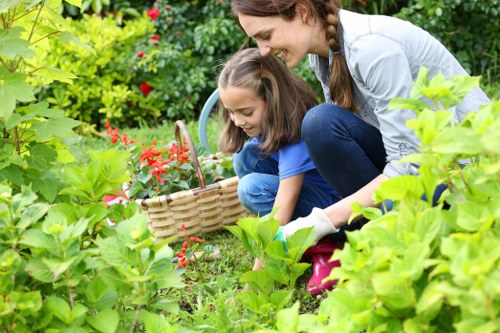
Maintaining a beautiful garden in Glenwood requires a combination of knowledge, dedication, and the right resources. Whether you're a seasoned gardener or just starting out, understanding the unique climate and soil conditions of Glenwood is essential for creating a thriving outdoor space.
Glenwood's climate, characterized by its temperate weather and occasional rainfall, provides an ideal environment for a wide variety of plants. However, successful garden maintenance involves more than just planting the right species. It requires regular care, including watering, pruning, weeding, and fertilizing, to ensure that your garden remains healthy and vibrant throughout the year.
One of the first steps in garden maintenance is soil preparation. Glenwood's soil may vary in composition, but generally, it is a mix of sandy and clay particles, which can affect drainage and nutrient retention. Conducting a soil test can help determine the pH level and nutrient content, allowing you to amend the soil appropriately to support plant growth.

Essential Garden Maintenance Practices
Effective garden maintenance involves several key practices that work together to create a sustainable and attractive garden. These practices include:
- Watering: Ensuring that plants receive the right amount of water is crucial. Overwatering can lead to root rot, while underwatering can cause plants to wilt and die.
- Pruning: Regular pruning helps to remove dead or diseased branches, promote healthy growth, and maintain the desired shape of plants and trees.
- Weeding: Keeping the garden free of weeds is important as they compete with your plants for nutrients, sunlight, and water.
- Fertilizing: Providing plants with the necessary nutrients through fertilization supports robust growth and resilience against pests and diseases.
Implementing these practices consistently will help maintain the health and beauty of your Glenwood garden throughout all seasons.
In addition to these fundamentals, integrating organic gardening techniques can enhance soil health and reduce the need for chemical interventions. Composting, using organic mulches, and planting cover crops are excellent ways to nourish your garden naturally.
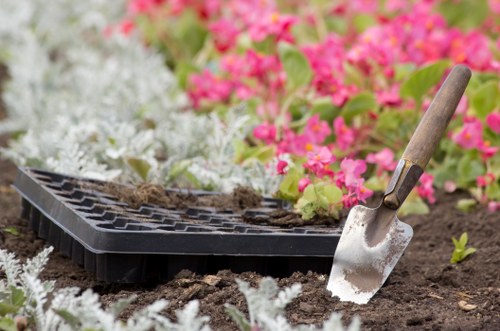
Seasonal Garden Maintenance in Glenwood
Each season in Glenwood brings its own set of challenges and opportunities for garden maintenance. Adapting your care routine to the changing weather ensures that your garden remains in peak condition year-round.
Spring Maintenance
Spring is the time for rejuvenation and preparation. Start by cleaning up any debris from the winter months, such as fallen leaves and dead plants. This is also the ideal time to plant new flowers, shrubs, and trees, as the soil begins to warm and provides a conducive environment for growth.
Summer Care
During the hot summer months, focus on maintaining adequate moisture levels. Implementing an efficient irrigation system, such as drip irrigation, can help conserve water while ensuring that plants receive consistent hydration. Additionally, apply mulch to retain soil moisture and regulate temperature.
Autumn Preparations
As temperatures cool, prepare your garden for the upcoming winter. This involves clearing out spent plants, pruning perennials, and adding protective covers to sensitive plants. Autumn is also a great time to plant bulbs that will bloom in the spring.
Winter Maintenance
Winter may slow down garden activities, but it's still important to monitor plant health and protect against frost damage. Use burlap or other protective materials to shield delicate plants, and consider applying mulch to insulate the soil.
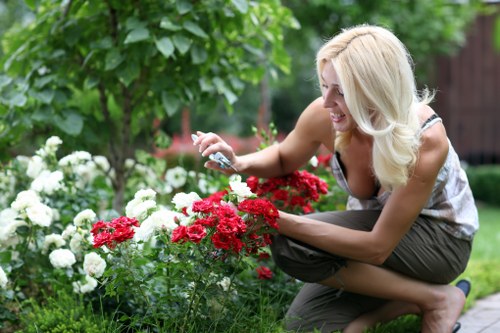
Choosing the Right Plants for Glenwood Gardens
Selecting plants that thrive in Glenwood's climate is essential for a low-maintenance and beautiful garden. Consider native plants that are well-adapted to the local environment, as they typically require less water and are more resistant to pests and diseases.
Some popular choices for Glenwood gardens include:
- Hostas: Known for their attractive foliage, hostas are shade-tolerant and easy to care for.
- Lavender: This fragrant herb not only adds beauty but also attracts pollinators like bees and butterflies.
- Daylilies: With their vibrant colors and minimal care requirements, daylilies are a favorite among gardeners.
- Roses: Classic and versatile, roses can be cultivated in various styles to suit any garden aesthetic.
By selecting a mix of evergreen and seasonal plants, you can ensure year-round interest and structure in your garden.
Additionally, incorporating fruit-bearing plants, such as berries and dwarf fruit trees, can provide both beauty and practical benefits.

Gardening Tools and Equipment for Maintenance
Having the right tools and equipment is vital for efficient garden maintenance. Investing in high-quality tools can make tasks easier and more enjoyable.
- Pruning Shears: Essential for trimming and shaping plants, pruning shears provide precision and control.
- Garden Hose: A durable and flexible garden hose is necessary for watering your plants effectively.
- Spade and Shovel: These tools are crucial for digging, planting, and moving soil.
- Wheelbarrow: A wheelbarrow simplifies the transport of heavy materials, such as soil and compost.
- Weeder: A specialized tool for removing stubborn weeds without disturbing the surrounding plants.
Additionally, consider ergonomic tools to reduce strain during prolonged use, and ensure regular maintenance of your equipment to extend their lifespan.
For larger gardens, electric or gas-powered equipment, such as lawn mowers and trimmers, can save time and effort.
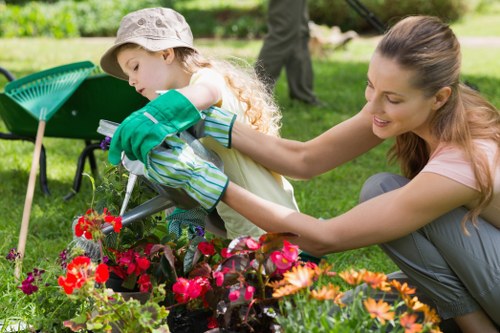
Pest and Disease Management
Protecting your garden from pests and diseases is a critical aspect of maintenance. Regular monitoring and early intervention can prevent minor issues from escalating into major problems.
Implement an integrated pest management (IPM) approach, which combines biological, cultural, and chemical methods to control pests sustainably. Encourage beneficial insects, such as ladybugs and lacewings, which naturally prey on common garden pests.
Use disease-resistant plant varieties and practice proper sanitation by removing diseased plant material promptly. Applying organic fungicides and pesticides, when necessary, can help manage infestations without harming the environment.
Focusing on plant health through proper watering, fertilization, and soil management also enhances resilience against pests and diseases.
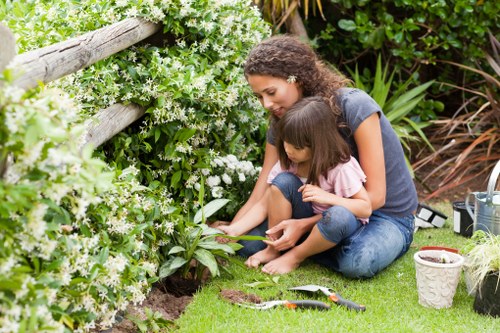
Local Gardening Services in Glenwood
For those who prefer professional assistance, Glenwood offers a range of gardening services to meet various needs. These services include:
- Lawn Care: Regular mowing, aeration, and fertilization services to maintain a lush and healthy lawn.
- Landscape Design: Expert designers can help create customized garden layouts that enhance the beauty and functionality of your outdoor space.
- Tree Trimming: Professional arborists provide safe and precise tree trimming and removal services.
- Seasonal Cleanup: Comprehensive cleanup services to prepare your garden for different seasons, including leaf removal and plant bed maintenance.
- Irrigation Installation: Efficient irrigation systems are installed and maintained to ensure optimal watering for your plants.
Hiring local gardening professionals ensures that the services are tailored to Glenwood's specific climate and soil conditions, leading to better results and a more resilient garden.
Additionally, supporting local businesses contributes to the community's economy and fosters relationships with knowledgeable experts who understand the unique challenges of gardening in Glenwood.
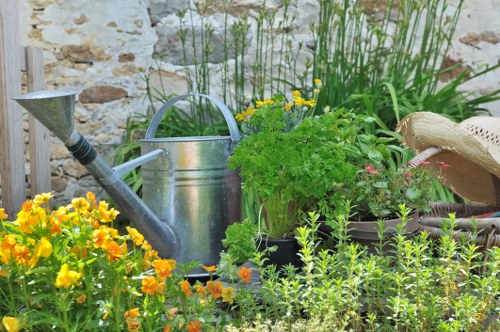
Sustainable Gardening Practices
Embracing sustainable gardening practices not only benefits the environment but also promotes a healthier and more robust garden. Consider the following eco-friendly strategies:
- Composting: Recycling kitchen and garden waste into nutrient-rich compost improves soil health and reduces landfill waste.
- Rainwater Harvesting: Collecting rainwater for irrigation conserves water and reduces reliance on municipal sources.
- Organic Fertilizers: Using natural fertilizers, such as manure and bone meal, avoids the harmful effects of synthetic chemicals.
- Native Plants: Planting native species supports local wildlife and requires fewer resources to maintain.
- Mulching: Organic mulches retain moisture, suppress weeds, and enhance soil structure.
Implementing these practices contributes to a sustainable ecosystem and creates a garden that thrives with minimal environmental impact.
Furthermore, sustainable gardening can lead to cost savings by reducing the need for chemical inputs and conserving water.
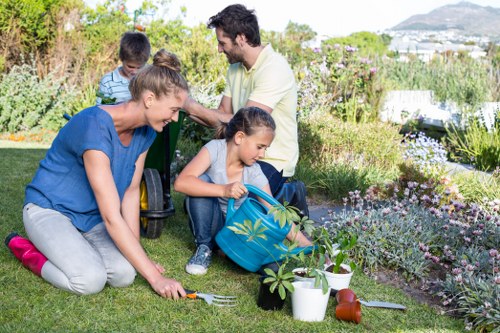
Gardening Tips for Beginners in Glenwood
Starting a garden in Glenwood can be an exciting and rewarding endeavor. Here are some essential tips for beginners:
- Start Small: Begin with a manageable garden size to avoid feeling overwhelmed and to ensure success.
- Choose the Right Plants: Select plants that are well-suited to Glenwood's climate and soil conditions.
- Plan Your Layout: Organize your garden space thoughtfully, considering factors like sunlight, plant height, and watering needs.
- Learn About Soil: Understanding your soil's composition and fertility is key to healthy plant growth.
- Establish a Routine: Consistent maintenance practices, such as regular watering and weeding, are essential for a thriving garden.
Additionally, take advantage of local resources such as gardening workshops, community gardens, and online forums to gain insights and support.
Remember, gardening is a learning process. Don't be afraid to experiment and adjust your techniques as you gain experience.

Decorative Elements to Enhance Your Garden
Incorporating decorative elements can elevate the aesthetic appeal of your Glenwood garden. Consider adding:
- Garden Ornaments: Statues, fountains, and decorative stakes add visual interest and personality.
- Lighting: Outdoor lighting highlights key features and extends the usability of your garden into the evening.
- Seating Areas: Benches, chairs, and pergolas create inviting spaces for relaxation and socializing.
- Pathways: Stone, gravel, or wooden pathways guide visitors through the garden and add structure.
- Water Features: Ponds, streams, and waterfalls introduce soothing sounds and attract wildlife.
These elements not only enhance the beauty of your garden but also make it a more enjoyable and functional space.
Balancing decorative features with plant life ensures that your garden remains both attractive and natural.
Local Flora and Fauna in Glenwood Gardens
Understanding the local flora and fauna can enrich your gardening experience in Glenwood. The region is home to a diverse range of plants and wildlife that can coexist harmoniously with your garden.
By planting native species, you support local ecosystems and provide habitats for beneficial insects, birds, and other wildlife. This biodiversity contributes to a balanced garden environment, enhancing resilience against pests and diseases.
Additionally, attracting pollinators like bees, butterflies, and hummingbirds can improve plant pollination and overall garden health.
Creating a wildlife-friendly garden involves providing shelter, food sources, and water. Incorporate features such as birdhouses, insect hotels, and small water ponds to encourage a vibrant and lively garden ecosystem.
Embracing the natural biodiversity of Glenwood not only beautifies your garden but also fosters a sustainable and thriving outdoor space.
Planning for Garden Expansion
As your gardening skills grow, you may consider expanding your Glenwood garden. Planning for expansion involves careful consideration of space, resources, and sustainability.
Start by assessing the current layout and identifying areas with potential for additional planting or new features. Consider factors such as sunlight exposure, soil quality, and accessibility when deciding where to expand.
Incorporate a variety of plant types, including perennials, annuals, shrubs, and trees, to create a diverse and dynamic garden. Diversification enhances biodiversity and ensures resilience against environmental changes.
Additionally, integrating vertical gardening techniques, such as trellises and raised beds, maximizes space and adds visual interest.
Planning for garden expansion should also include sustainable practices to maintain environmental balance and resource efficiency.
Maintaining Garden Health
The overall health of your garden is a reflection of the maintenance practices you implement. Consistent care ensures that plants remain strong and disease-free.
Regular inspection of plants helps identify issues early, allowing for prompt intervention. Look for signs of stress, such as yellowing leaves, wilting, or unusual growth patterns, which can indicate underlying problems.
Implementing a balanced fertilization schedule supports plant nutrition without causing overgrowth or environmental harm. Choose fertilizers based on the specific needs of your plants and soil conditions.
Weed control is another critical aspect of garden health. Use mulching, manual weeding, and selective herbicides to manage unwanted growth effectively.
By prioritizing garden health, you create a resilient and flourishing outdoor space that enhances your enjoyment and the beauty of Glenwood.
10-15 Nearby Areas to Glenwood for Garden Maintenance
Glenwood is surrounded by several charming communities, each offering unique features for garden enthusiasts. Here are some of the closest areas to Glenwood and what they offer:
- Riverside: Located just 5 miles east, Riverside is known for its lush riverbanks and community gardens.
- Mapleton: 7 miles to the north, Mapleton boasts extensive nurseries and plant shops.
- Sunset Valley: 10 miles south, Sunset Valley features scenic walking trails and garden parks.
- Oakwood: 8 miles northwest, Oakwood is renowned for its historical gardens and arboretums.
- Brookside: 6 miles northeast, Brookside offers family-friendly green spaces and botanical displays.
- Fairview: 12 miles west, Fairview has a thriving community of amateur gardeners and seasonal flower shows.
- Pinecrest: 9 miles southeast, Pinecrest is home to numerous private gardens and landscaping services.
- Lakeview: 11 miles southwest, Lakeview provides beautiful lakeside gardens and water feature installations.
- Elmwood: 4 miles northeast, Elmwood is known for its sustainable gardening practices and eco-friendly initiatives.
- Greenfield: 3 miles west, Greenfield offers a variety of garden centers and horticultural schools.
- Hilltop: 14 miles north, Hilltop features elevated gardens with panoramic views and unique plant collections.
- Meadowbrook: 2 miles south, Meadowbrook is celebrated for its open-air markets and garden expos.
- Cedar Grove: 13 miles east, Cedar Grove has extensive green belts and wildlife-friendly gardens.
- Willow Springs: 15 miles southwest, Willow Springs is known for its seasonal flower blooms and community planting events.
- Birchwood: 1 mile northwest, Birchwood offers intimate garden settings and personalized gardening services.
Each of these nearby areas contributes to the rich gardening culture of Glenwood, providing residents with ample resources and inspiration for their garden maintenance projects.
Conclusion and Get Started Today
Maintaining a garden in Glenwood is a fulfilling endeavor that enhances your home's beauty and provides a tranquil outdoor retreat. By following the best practices outlined in this guide, you can ensure that your garden remains healthy, vibrant, and resilient throughout the year.
From selecting the right plants and implementing sustainable practices to utilizing local gardening services and exploring nearby gardening communities, there are numerous resources available to support your gardening journey.
Take the first step towards a flourishing Glenwood garden by planning your garden maintenance strategy today. Whether you choose to tackle the tasks yourself or enlist the help of professionals, the rewards of a well-maintained garden are well worth the effort.
Contact us today to learn more about our garden maintenance services or book your service now and transform your outdoor space into a stunning oasis.
